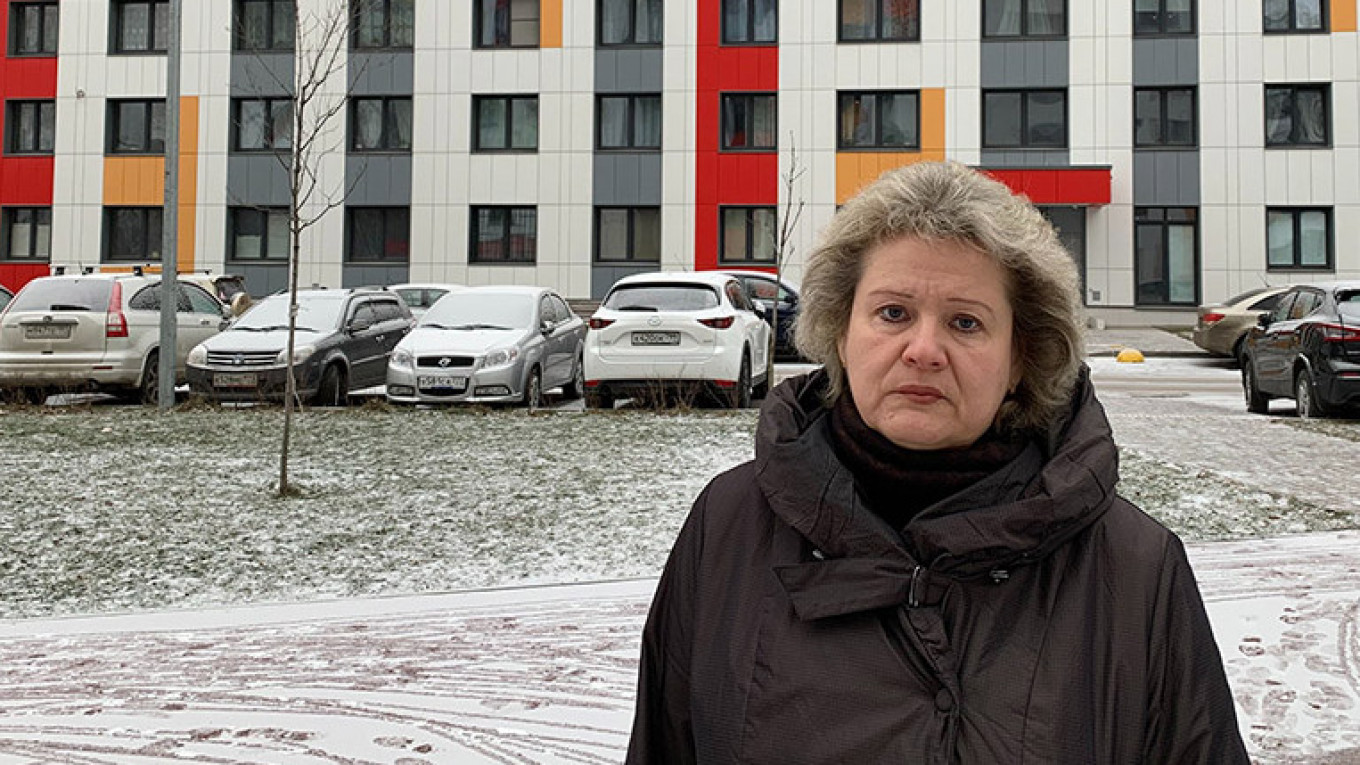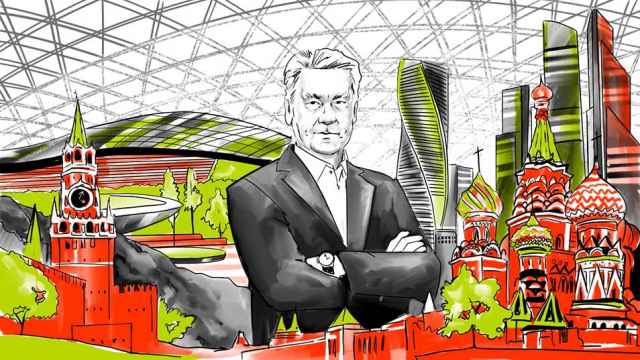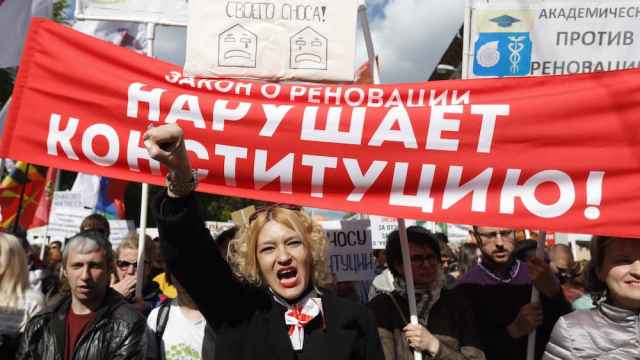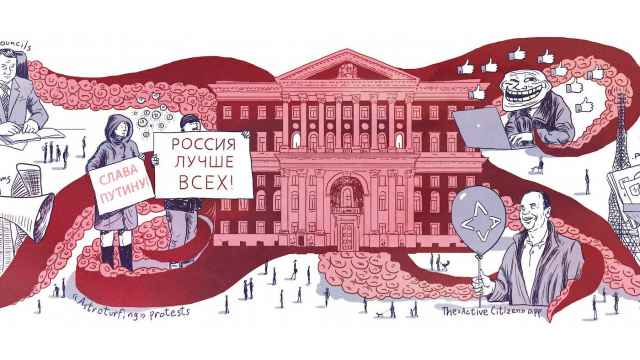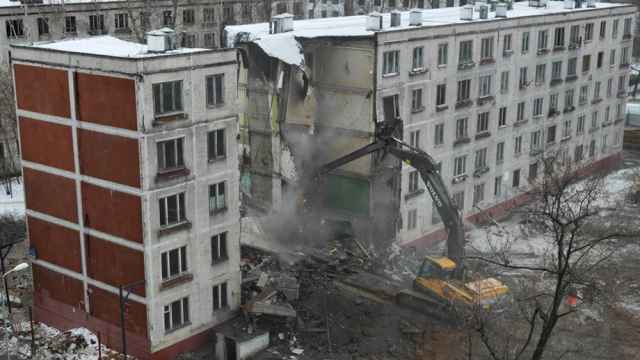Time ticked away as 85-year-old Alexandra Zhiglova lay on the floor of the stuck elevator, a team of paramedics monitoring her vital signs. When they finally got her out and into an ambulance, more than 40 minutes had passed.
Doctors call the crucial period within which stroke victims must be treated for them to avoid serious brain damage, or even survive, the golden hour. Between her initial call to the emergency services and getting trapped, Zhiglova didn’t stand a chance of making that window. She died two days later, on Nov. 19.
For the past 11 months, Zhiglova had lived on the 15th floor of a new 23-story high-rise, where she had moved in a rush last December along with other residents of a nearby older building slated to be demolished in Moscow’s Kuntsevo neighborhood on the western edge of the city.
Before they had even moved in, the residents had begun making complaints to officials about the building’s poor-quality elevators. But until Zhiglova’s death, they say, no one batted an eye.
“The indifference to human life shown by the authorities and the responsible companies is astonishing,” said Alexei Nozdrin, 49, who moved into the new building along with Zhiglova last year. “We asked for something be done many times and no one did a thing.”
Zhiglova had been Nozdrin’s neighbor all his life, most of which had been spent in one of the many prefab five-story apartment buildings around the Russian capital that were built in the early 1960s.
The homes, named khrushchevki after Soviet leader Nikita Khrushchev, were hastily constructed to deal with a post-World War II housing crisis and only meant to last 50 years. In 1999, then-Moscow mayor Yury Luzhkov announced a plan to move residents out of the crumbling buildings into brand-new high-rises. Many residents, including Zhiglova, supported it.
For years, however, the policy proceeded in fits and starts until current mayor Sergei Sobyanin announced a much more ambitious program in early 2017. Entire districts could now be torn down, regardless of their age or height.
Valuable land
Critics saw the program as a ploy for developers to swoop up valuable land. That spring and summer, activists mobilized in Moscow and stirred up mass demonstrations. As many as 30,000 people turned up at one rally to protest against the plans.
But the authorities bulldozed ahead with the project nonetheless, and Luzhkov’s stalled work was also given a fresh push. By September 2018, residents in Zhiglova and Nozdrin’s khrushchevka were being given a choice of new homes.
The one option they didn’t have was to stay.
“We already knew then that the elevators weren’t working in the new building and I said that I wouldn’t move until they were fixed,” Nozdrin said. “But they had already started to turn off our electricity in the old place. We were between a rock and a hard place: Do you stay without light or do you go where the lifts don’t work?”

When the residents showed up at the new building with their belongings in December, even the service elevator for furniture wasn’t working.
“The day I received my keys I got stuck in the elevator,” said Konstantin Vanag, 42. This week he met with representatives of the building’s developer, but said the meeting didn’t produce any results.
In total, residents count that, since moving in, they have filed 166 complaints to various government departments.
Unsure of where else to turn, residents began appealing to journalists. In March, a local television channel featured the building on the evening news. Grievances included pensioners and disabled people having to walk up many flights of stairs, the building management company not responding for a week and a woman stuck in an elevator for two hours unable to get to her medication.
Last week, after Zhiglova’s death, the situation made national news, but parties involved in managing the building deflected charges. In a Rossiya-1 state television channel broadcast, an official from a department that oversees elevator inspections blamed the company servicing the building for the problems. That company, in comments to BBC News Russian, denounced the developer. Which, in turn, shifted the blame back onto the servicing company.
For his part, Denis Shenderovich, a Kuntsevo municipal deputy, blames Zhiglova’s death on “corruption on the part of all of the above parties.”
“They are all responsible and they must be tried criminally,” he said.
Experts on urban development foresaw the potential problems with the urban renewal plans years ago.
While meetings with government representatives over the plans were ongoing in 2015, Irina Irbitskaya, director of the Moscow-based Center for Urban Development Competencies founded two years earlier at the behest of President Vladimir Putin, withdrew. Already then, she told The Moscow Times this week, it was clear that the project would violate “the rights of many people and goes against the constitution.”
“The initiators of the project took into account only big interests,” Irbitskaya said. “And because the program was in the interest of developers, their main concern was freeing up land and moving people somewhere else as quickly as possible.”
“If citizens were part of the planning process, then the priority would have been exactly the other way around,” she added. “Livable homes would have been ensured first, then the residents would have been moved after.”
The Investigative Committee has opened a criminal investigation into Zhiglova’s death, but residents say their concerns should have been heard earlier and that they are considering filing suit against the responsible parties.
Zhiglova herself had foreseen possible tragedy just months earlier. In comments to a local television reporter in mid-August, she said that she had just recently been stuck in the elevator for five hours.
“You get to the elevator and you pray: ‘Dear God, let me get there without anything happening.’”
A Message from The Moscow Times:
Dear readers,
We are facing unprecedented challenges. Russia's Prosecutor General's Office has designated The Moscow Times as an "undesirable" organization, criminalizing our work and putting our staff at risk of prosecution. This follows our earlier unjust labeling as a "foreign agent."
These actions are direct attempts to silence independent journalism in Russia. The authorities claim our work "discredits the decisions of the Russian leadership." We see things differently: we strive to provide accurate, unbiased reporting on Russia.
We, the journalists of The Moscow Times, refuse to be silenced. But to continue our work, we need your help.
Your support, no matter how small, makes a world of difference. If you can, please support us monthly starting from just $2. It's quick to set up, and every contribution makes a significant impact.
By supporting The Moscow Times, you're defending open, independent journalism in the face of repression. Thank you for standing with us.
Remind me later.



